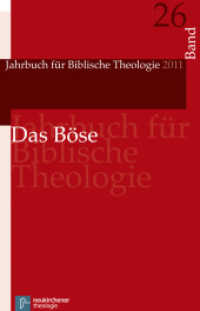- ホーム
- > 洋書
- > 英文書
- > Business / Economics
Full Description
Intelligence professionals are commonly viewed as solo operators. But these days intelligence work is mostly about collaboration. Interdisciplinary and even inter-organizational teams are necessary to solve the really hard problems intelligence professionals face. But the potential is often wasted when these teams devolve into wheel-spinning, contentious assemblies that get nothing done. Or members may disengage from a team if they find its work frustrating, trivial, or a waste of their time. Even teams with a spirit of camaraderie may take actions that are flat-out wrong.But there is also good news. This book draws on recent research findings as well as Harvard Professor Richard Hackman's own experience as an intelligence community researcher and advisor to show how leaders can create an environment where teamwork flourishes. Hackman identifies six conditions - such as establishing clear norms of conduct and providing well-timed team coaching - that need to be in place for a team to perform superbly. Although written explicitly for intelligence, defense, crisis management, and law enforcement professionals, this book is valuable for improving team success in all kinds of teams in business, government, and nonprofit enterprises.
Contents
Part One1: Teams that Work and Those That Don't2: When Teams, When Not?3: You Can't Make a Team Be Great Part Two: The Six Enabling Conditions4: Create a Real Team 5: Specify a Compelling Team Purpose 6: Put the Right People on the Team 7: Establish Clear Norms of Conduct 8: Provide Organizational Supports for Teamwork 9: Provide Well-timed Team Coaching Part Three: Implications for Leaders and Organizations10: Leading Intelligence Teams 11: Intelligence Teams in Context







